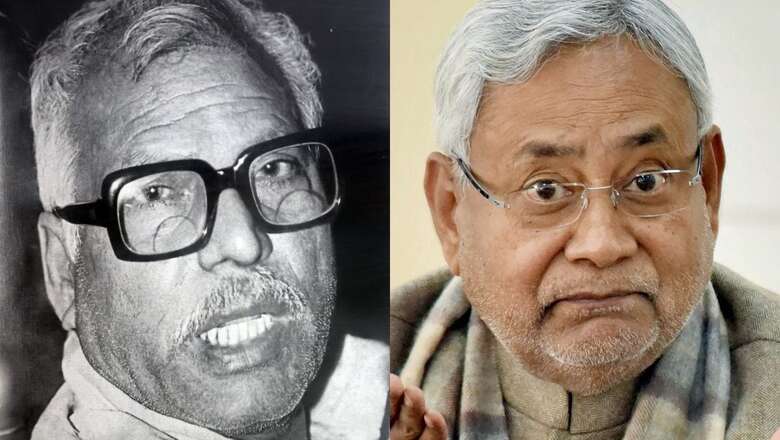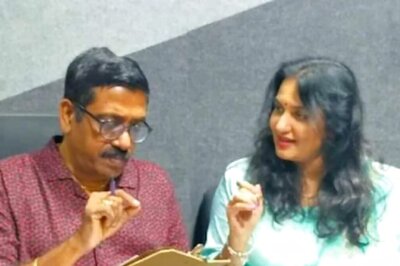
views
Karpoori Thakur, Jan Nayak of Backward politics in Bihar, has been chosen for the country’s highest civilian award Bharat Ratna a day ahead of his birth anniversary.
The announcement to confer the country’s highest civilian award by the Rashtrapati Bhavan received praise from the ruling parties in Bihar- Nitish Kumar-led JD(U) and RJD and the opposition BJP and its allies.
Prime Minister Narendra Modi said the government’s decision to confer Thakur with the Bharat Ratna is a testament to the socialist leader’s enduring efforts as a champion for the marginalised and a stalwart of equality.
Who Was Karpoori Thakur?
Karpoori Thakur, popularly known as ‘Jan Nayak’, served as the chief minister of Bihar from December 1970 to June 1971 and from December 1977 to April 1979.
पूर्व मुख्यमंत्री और महान समाजवादी नेता स्व॰ कर्पूरी ठाकुर जी को देश का सर्वोच्च सम्मान ‘भारत रत्न’ दिया जाना हार्दिक प्रसन्नता का विषय है। केंद्र सरकार का यह अच्छा निर्णय है। स्व॰ कर्पूरी ठाकुर जी को उनकी 100वीं जयंती पर दिया जाने वाला यह सर्वोच्च सम्मान दलितों, वंचितों और…— Nitish Kumar (@NitishKumar) January 23, 2024
Thakur was born in 1924 in a village in Samastipur district in one of the most backward sections — the Nai Samaj (barber community). He was a leader whose political journey was marked by his unwavering commitment to the marginalised sections of society.
Thakur began his political activism as a young student during the Quit India which caused him to spend several months in jail. Although he initially took up a teacher’s job in a village school, he had always been interested in politics and showed promise when he emerged victorious in the first state assembly election held in 1952, from Tajpur constituency, as a candidate of the Socialist Party at a time when the politics was dominated by the Congress.
Karpoori Thakur had been close to Jayaprakash Narayan, though later he also grew close to Ram Manohar Lohia. His leadership qualities were such that despite being from a so-called lower caste, he was respected by those hailing from the upper castes.
Rise in Politics
Karpoori Thakur rose to prominence in 1967, when the state saw its first non-Congress government headed by Mahamaya Prasad Sinha.
Thakur, who became the Deputy Chief Minister of Bihar, also held the education portfolio and is often remembered for doing away with English as a compulsory subject in schools.
Thakur had two short-lived tenures as the Chief Minister where his power did not last for long. But, in those days, the rise to the highest seat of power was no mean feat for a person coming from a poor family and the extremely backward and numerically small caste Nai (barber), says veteran RJD leader Shivanand Tiwary, whose late father Ramanand Tiwary had been one of the comrades in arms of Thakur.
Thakur never lost any election after winning his first time in 1952 due to his popularity on the back of his simple living and championing of social justice.
Why Karpoori Thakur Enjoys Prominence in Bihar Politics?
Thakur was the first leader in Bihar to push for the empowerment of the backward classes, which ultimately led to the implementation of the Mandal Commission recommendations.
While the Nai community just had 1.6 per cent of the population in the 1970s, Thakur was the first to mobilise the backward castes when there was limited political space for them in state politics. He paved the way for 26 per cent reservation for them in the government services in Bihar in 1978.
Later, the VP Singh-led government repeated Karpoori’s backward outreach by implementing the Mandal Commission recommendations for reservation for Other Backward Classes (OBC) at an all-India level in 1990.
The implementation led the OBCs into a potent electoral bloc and led to the rise of Mandal politics in Bihar with regional parties including the ruling Janata Dal (United) (JD(U)) and the Rashtriya Janata Dal coming into power.
How Nitish Followed Karpoori’s footsteps
Both RJD supremo Lalu Prasad Yadav and CM Nitish Kumar have cashed in on the Karpoori legacy to ensure that the reins did not slip out of the hands of backward classes since the 1990s.
Nitish Kumar, the longest-serving Chief Minister in Bihar, ensured implementation of Karpoori’s formula in the context of the reservation of jobs in Bihar.
Thakur had divided the backward castes into “relatively more backward” and “relatively less backward”. Nitish used Thakur’s formula to classify backward classes into two categories – extremely backward class (EBC) and other backward class (OBC).
The Bihar CM also reserved 18% and 12% of the government jobs for the EBCs and OBCs respectively for them to establish himself as the leader of EBCs to counter Lalu Prasad Yadav’s vote bank.




















Comments
0 comment